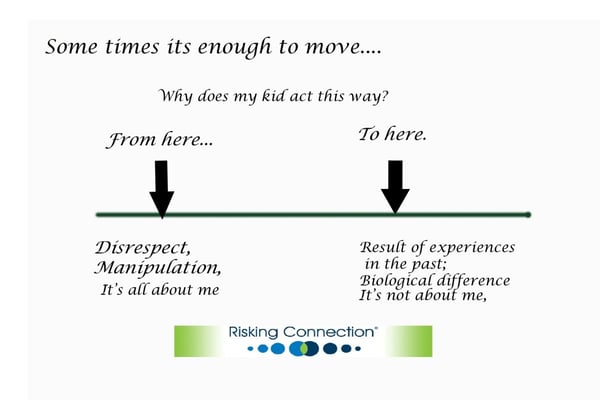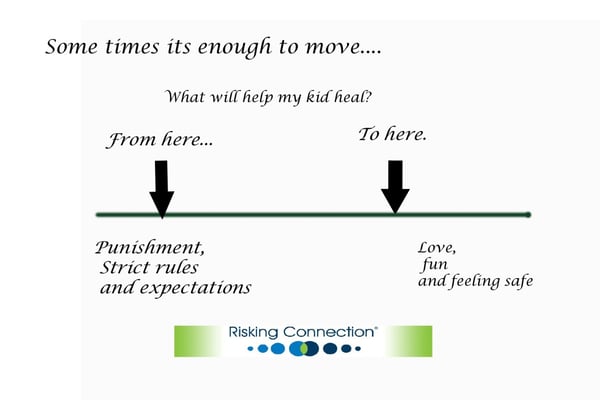As part of our Whole System Change Model, the Traumatic Stress Institute offers training to trainers of foster parents. This sort of training requires honoring the unique position and perspective of foster parents, and so it is a different situation than training staff.
Foster parents have committed themselves to welcoming children into their homes. Many of them have successfully raised their own children. They often have friends and family around them who are free with advice on how to parent (“Why are you letting her get away with that behavior?!”). For these reasons and more, we as trainers need to recognize that there are limits to how much the foster parent may be willing to change.
Over time I have come to believe that our most fundamental goal is to help the parent keep the child. There are many styles of parenting that are completely fine. I do not really care if a parent grounds the child when he acts up or if they don’t. If the parent sees the good in the child, cares about them, and enjoys being with them, then how can we help that parent not give up? What our children need most of all is to stay somewhere. It can be an imperfect somewhere; as long as it is not abusive, it is safe and it is caring, it can be a sustainable placement.
The question then becomes, “How can we support the parent in perseverance and what role can training play in this goal?” I would suggest that we have two crucial continuum we are trying to help foster parents gain movement on in training. One is to redefine the parent’s understanding of this question: “Why does my kid act this way?” We would like to help the parent to use trauma theory to understand the adaptive nature of the child’s actions. Three important concepts in achieving this are: the biological changes caused by trauma; the lack of learned skills due to trauma or unstable relationships; and the behaviors a child uses to help themselves feel better in the moment (and we all do this, by the way). In other words, we hope to help the foster parent move away from words like “disobedient” and “disrespectful” and toward words like “frightened” or “confused”. We hope that the foster parent can see behaviors as less about them and more about the child’s adaptations as a result of trauma.
Here’s an example: Marci is a wonderful foster parent in many ways. Yet she is often annoyed by her foster son Rob’s constant negativity. One instance she shared during a training was about dinner. When Marci told Rob that they were having spaghetti for dinner—something she made because she knows he loves it—he responded by saying “Oh no, I hate spaghetti!” Marci answered him by saying, “It is very good spaghetti and I am a good cook.” In telling this story, Marci indignantly reported that he has eaten her spaghetti before, that others seem to like it, that she follows a good recipe, etc. She was defensive and had taken Rob’s comments personally. When asked if Rob would have responded the same way if she had announced chicken or steak, she said, “Of course. He is always that way.” So it’s not about the spaghetti. It’s about Rob protecting himself against the disappointment that has been such a prominent feature in his life. When she is out of the situation, Marci understands this. And yet, the dynamic continued. When she told Rob that they were going to the park, he complained that he has always hated that park and didn’t want to go there. Immediately Marci began to defend herself and her choice of park. We suggested to her in training that we were going to write on her hand in indelible ink: IT’S NOT ABOUT YOU!!!!!
The foster parent doesn’t have to completely buy this concept. But any progress they can make along this continuum will be powerful in preserving the placement.

The other crucial continuum concerns this question: “What will help my kid heal?” Through trauma theory, we hope to lead the foster parent to understand that children act better when they feel better. When the foster child feels safe, connected, noticed, and cared about they will be able to relax and have more fun. When through every day acts of caring the child begins to consider a new view of other people, the child will begin to trust. They will begin to come to the parent with their worries and concerns, and to ask for help.
Again, we can’t expect the parent to re-learn everything society has taught them about the value of punishment. But if through training we can accomplish any movement on this continuum, we help preserve the placement:

As RC Foster Care Trainers, it is our responsibility to respect the lived experience of foster care parents while helping them reframe their foster child’s behaviors. It is a delicate balance, but better understanding of the underlying relational dynamics increases the likelihood of long-term success of the child in their placement. And it can help foster parents create opportunities for healing that turn the child’s “placement” into their “home”.


